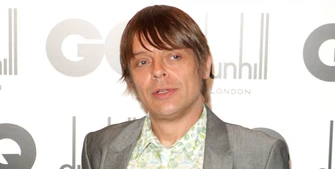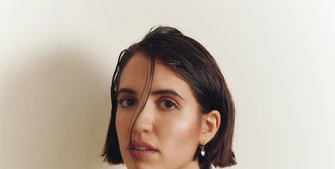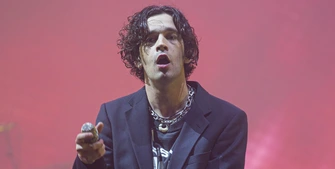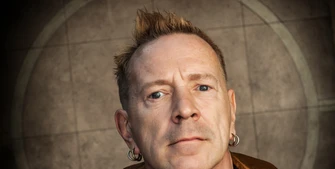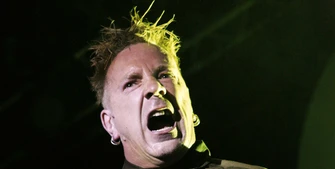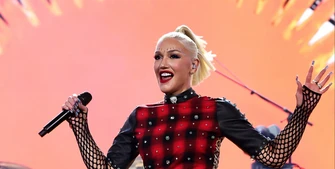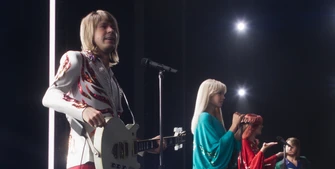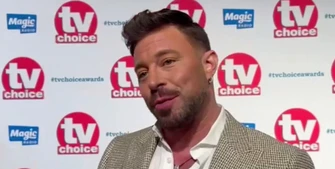Interview: The Ramona Flowers on their powerful new album, making sacrifices for success, and working with music royalty
The Ramona Flowers' Steve Bird, Sam James, Dave Betts, and Ed Gallimore discuss their nerves of releasing Made By Humans after a five-year delay, 'ripping off' Nile Rodgers' music style on a track and then going on to make their biggest single with him, and how AI can be a useful tool in music.
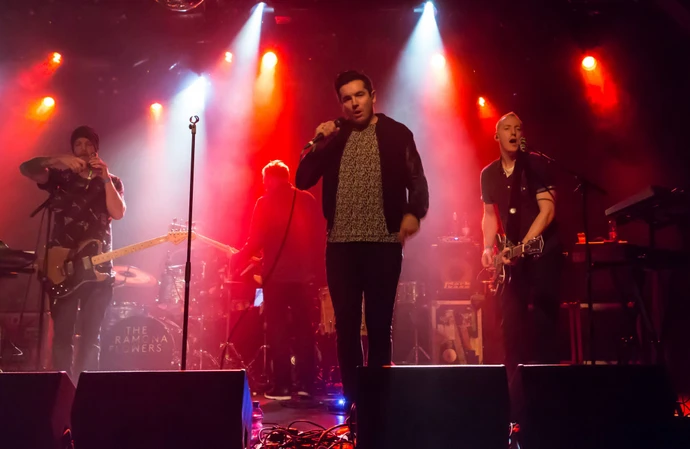
The Ramona Flowers have done the "hard slog".
Since the group's inception in 2014, members Steve Bird (vocals), Sam James (guitar), Dave Betts (keyboards, guitar), and Ed Gallimore (drums) have spent years "playing to nobody in all kinds of places", as well as made some huge sacrifices - including Sam "almost missing the birth of [his] daughter" - to find success in music.
And it has paid off, as they have supported the likes of Noel Gallagher, Supergrass, Bastille, as well as collaborated with music legend Nile Rodgers on their single, Up All Night.
The electrifying track shot the trio to global stardom, with it achieving 1.5 million streams on Spotify, 4 million worldwide plays, and a spot in the Top 25 US Alternative Radio Chart.
As The Ramona Flowers' success continues to soar, they have just released their powerful 13-track album, Made By Humans - which has taken five years to make due to the COVID-19 pandemic.
Contact Music caught up with Steve, Sam, David, and Ed over Zoom to talk about why they are nervous about the record being released, how the Bristol band got to work with and support music royalty, why AI can be a useful tool in music, and how they are close to achieving their ultimate goal.
Contact Music: How do you all feel about releasing your powerful new 13-track album, Made by Humans?
Sam: Excited and nervous. Let's just hope that people like it!
What makes you nervous about its release?
Sam: You just never know how people are going to take it, right? You want people to love it and get into it and discover it.
Ed: Especially after how long it's taken to [make it]. It's been a lot of work for us.
Steve: It's nice for it to finally come out, though, because it's been a period of our lives.
So I think once this is out, we can maybe start to think about what comes off [the back of it].
Ed: That's also nerve-racking, because now it's like, what next?
How long did it take to write the album?
Sam: Well, we lost three years during COVID - it's taken five years. In an ideal world, it would be two years.
Steve: It was interesting because we wrote quite a big chunk of it when we went to Ireland for six weeks, and we kind of thought it was finished, and then, for various reasons, it didn't come out.
And then we ended up writing way more songs. And the actual original album, we thought, changed into this album, which I think is a much better body of work because of it.
Do you have more songs on the album than initially intended?
Sam: Yeah, we got loads.
Ed: There's probably another album with songs that didn't make this record.
Sam: It's good, it's nice, because we know we've got stuff in the bank, which takes the pressure off.
The album is titled Made by Humans. What is the message behind the name?
Sam: When we started out with that, with this album, it was, we just really wanted to get back into being a sort of proper, real band, as opposed to electronic stuff, which we've been sort of playing with before on some of the previous albums.
And we're all really good players. When we go and play live, it's the real deal. And so we just wanted it to have that real band [element]. And we've been together for a long time, and we love each other. We're a real band.
And when you put it all together, we just want people to realise it's made by us, by humans. In a world of AI, this is the real deal.
Steve: Lyrically, it's the most honest I've been because of heartfelt subjects. Like Sam says, especially now with AI, this is a real album about real things.
Why do you think it's important to be honest with your work?
Steve: Well, for all the artists I love the most, they always were. When you hear someone write from the heart, you believe what they're saying because they are telling the truth.
I think people connect to it in a much deeper way. And I think that's something that I've been striving to do for years, and I've maybe got there a little bit at times, but I feel this time I finally managed to just get where I wanted to get to.
Sam: It's also much easier to play songs live when they mean something to you as well. It's a whole better experience for everyone.
You all seem confident with this album. What makes you feel confident about it?
Sam: 13 bangers!
Steve: I don't know, it's a weird one because I suppose most bands or artists always say their newest is their best work. I think a lot of people will say that, but I think that we've reached a point after our last album that we wanted to do something different, and like Sam said, get down to being a real band again.
I think this is the album we all really wanted to make. So I think that's why we're confident.
Sam: We collaborated with Nile Rodgers on Up All Night, and that endorsement, quite early on, actually, when we were doing it, made us kind of think, 'OK, we must be doing something right here. It's pretty cool.'
What was the inspiration behind the album?
Steve: Real life, I guess, just, and that was kind of it, really.
Sam: Musically, I think we wanted stuff that was a bit more upbeat because we noticed from the previous albums, when we were going out playing live, we only had one or two, or three upbeat songs, and the rest didn't always translate.
So we went into this one thinking, 'We want some bangers that people can dance to, that get people going.' I guess that was the starting point.
How did collaborating with Nile Rodgers come about?
Ed: When we first wrote that was quite early on in the album process, and I remember we were in a studio in Paris, and we were cutting it for the first time. We're putting the guitars down, and they're all labeled Nile guitar because they're trying to mimic his kind of style.
And I think it was our manager who sat at the back of the room and then said, 'Why don't we just send it to him and see if he'll play on it?' We're all just thinking, 'Yeah, right. Whatever!'
Sam ended up getting a phone call a couple of weeks later, and it was Nile on the other end of the phone.
Sam: It was bonkers. I was like, 'Is somebody taking the p***? Is this for real?'
Ed: The group chat with the producer and everyone in it after it all came back and got put together was just like, 'God, we've just made a single with Nile Rodgers.'
It was pretty crazy.
Sam: I think he listened and, immediately, he was like,' Yeah, this is a great song, man.'
Why do you think it's important for him to support up-and-coming bands?
Ed: He's just a titan of the whole industry. He's working multiple genres, multiple styles. He's worked with some of the greats, and for him to even acknowledge something you do, let alone work with you, is a serious, big deal.
He's written some of the greatest songs of all time.
Sam: It's great that he's supporting new bands and endorsing them. He basically just said, 'It's a great song.' And that was it.
Why do you think he liked the song?
Steve: Just a groove of it.
Sam: Groove with the lyric.
Steve: We thought of him because it just feels like the kind of song he would play himself.
Were you inspired by his back catalogue when making the song?
Sam: Yeah, as I say, when we were doing the guitar parts, we were directly trying to rip him off!
Ed: It had that disco drum beat. What also lent into that was we brought in a friend of our producer, who brought in a guy, he worked with a bass player from Paris, who is the most unreal musician, and he is the funkiest man alive.
He leaned even further into the disco vibe, and then that's where it all came out.
Up All Night got 1.5 million streams on Spotify, four million global streams, and over 100,000 plays on the US radio. What has that done for the profile of the band?
Ed: Living in the UK and doing well on the other side of the Atlantic, it's kind of surreal. You arrive there, and you're like, 'Oh, OK.' And then you come home, and it's back to normal life again.
Does a part of you wish you were big in the UK first and then in the US? Or are you happy with how it's turned out?
Sam: It would be easier. But to be honest, it doesn't really matter.
Steve: As long as people are into it and get it. And we have a great time. The crowds out there are great. And we have such a good time. So it doesn't really bother us.
Ed: We just did our first-ever show in Mexico, and spent some time out there as well, which is a whole new experience for us. And that was awesome.
It's a real privilege for this to be happening to us, really. It's awesome. It feels great.
How has the success affected your lives?
Ed: I'm starting to go up the levels on British Airways, which is quite nice. The hotel points on Hilton and things. That's quite useful.
Sam: It's nice for family and partners to be seeing that stuff is happening now, because they've been put through it because we've been doing this for b***** ages.
And it's hard, you're trying to break it as a band, and we've done the slog. We've spent a lot of time playing to nobody in all kinds of places. It's tough to have that willpower to keep going, don't give up, because it will happen.
It's a strain on partners and family.
Ed: A lot of landmarks in life have been missed things and sacrifices made, the people we love have all had to go through that, and it's nice to pay them back a bit.
What kind of sacrifices have you made?
Sam: I almost missed the birth of my daughter. My wife went into labor at the time.
Ed: How old was your little one [Steve] when we went away to record the album?
Steve: She was a month old. Yeah, a month old. I was away for six weeks, which didn't go down very well.
You've been recognised by the likes of Noel Gallagher, Bastille, Muse, and to support artists like that must be a real pinch yourself moment?
Sam: Yeah, it's true. We supported Supergrass the other day, and that was a pinch yourself moment.
Steve: We supported Bastille really quite early on. And it was early on for them as well.
Ed: They went number one while we were on tour with them. And then on the next tour, we went out with Bombay Bicycle Club, and they went to number one while we were on tour with them.
If you want to number one, book us!
Steve: It was a great moment when we supported Bastille. There we were playing somewhere, and our bus turned up, and there were lots of screaming girls for them.
And we got off, they all screamed, and then they released us and went, 'Oh!'
And Sam, you mentioned at the start of the interview that AI is changing the music landscape. Do you think it's problematic for the music industry?
Sam: I personally don't think it is because the thing that really makes music important is the fact that it touches your soul.
I just don't think you'll ever be able to recreate that using AI, because it's essentially just a copy of what's come before, something that's different that captures you, and then to be able to go and see it live and get invested in it, you're just not going to be able to do that.
I think there'll be more of a backlash against it as well. The more stuff that comes out, the more people will be like, 'I don't want to go anywhere near that.' After a while, you don't want the fake s***. You want the real s***.
Have you experimented with it?
Sam: It is fun, there are funny things you can do with it.
Ed: But it's not creative.
Sam: It can be used as a tool. People use it as a time saver, if you want to start something quickly without having to go and find sounds and whatever.
You can just quickly, just do it, and it will create a drum track or whatever, or something, and then you can build on that. I mean, I suppose it can be used for that.
Where would you like to see the band in the future?
Steve: Global headline tours.
As good as it is to support some of these amazing bands, artists we've played with, you want to be out playing our own shows, and do we do. We're going to be doing that next year, probably starting in the US, doing our own headline tours.
So I think that's what we want to be.
What would you say is the ultimate goal?
Sam: The ultimate goal is to be heard by as many people as possible. I think with any band, that's what you want. Ultimately, you want to be playing arenas and stadiums.
Ed: Keep justifying existence. It makes sense to keep going, because we don't want to stop, we love what we do.
Made by Humans is out now.

